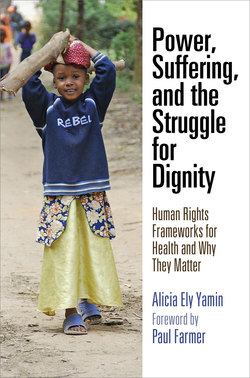Читать книгу Power, Suffering, and the Struggle for Dignity - Alicia Ely Yamin - Страница 7
На сайте Литреса книга снята с продажи.
ОглавлениеForeword
My profound admiration and respect for Alicia Ely Yamin and her work in health and human rights goes back many years, beginning well before our work together as editors of the journal Health and Human Rights. But when we each penned our first contributions as editors for the journal in 2007, our shared experiences, indignation, and understandings about the inequities in the world became even more evident.
Alicia is not just an extraordinary leader in the field but someone who has been in the trenches. She speaks authoritatively because she understands the ways in which cycles of poverty and disease become ingrained in poor communities across the globe, as the stories in this remarkable new book attest. Too often I have found that many human rights lawyers remain in the realm of the abstract, failing to address the realities of what health practitioners—and impoverished patients—face every day. In Power, Suffering, and the Struggle for Dignity, Alicia does exactly this, showing us what a human rights framework can and should mean.
Alicia and I, along with many of our colleagues, share the same sense of outrage at global inequities, and the need to enact transformative change. In our first issue of the journal, I wrote about having been “part of an effort to provide basic services—medical care, primary education, clean water, even exhumation and proper burial for the victims of mass violence—in Latin America, Siberia, and inner-city Boston. The people we served had neither a language nor a culture in common. What they had in common, by and large, was poverty.” Alicia may not have provided direct services, but it is apparent from this text how much time she has spent with impoverished women in labor and delivery rooms throughout the world, as well as in their communities and homes.
Our shared perspective on national and global inequities, on the “pathologies of power” as I have called them and the suffering they produce reaches beyond outrage to the desire to forge solutions. Although working in different professions, we both remain committed to the conviction that the root causes of poverty and ill health are inextricably linked to questions of justice, including the right to health. We share deep frustration with those limited conceptions of justice which would restrict the domain of human rights to a slim portion of civil and political liberties. But importantly, Alicia’s critiques of traditional human rights theory in Power, Suffering, and the Struggle for Dignity, emerge from within and propose alternative pathways for moving beyond frameworks that, in her words, “sit all too easily with neoliberalism.”
This theme of the connection between the power relations between the so-called “North” and “South” runs throughout Alicia’s profoundly moving book. Alicia describes this text as a call to remake our institutions and our social and legal arrangements at national and global levels. We owe as much to one another as human beings with equal dignity. This book deftly illustrates the core purpose of a human rights-based approach—eradicating the suffering arising from dramatic inequality within and between nations.
In Power, Suffering, and the Struggle for Dignity, Alicia makes the argument that the divide between theory and practice is deeply misleading; rather, she shows us repeatedly that the ways in which we think about global health problems shapes what we do about them—both in terms of substance and process. Alicia is quick to note that many human rights-based approaches have “only brought about incremental changes.” But she explains that incremental changes need not be a sign of failure, because a small change in a relationship of power can “trigger a cascade of changes, which create meaningful improvements in the effective enjoyment of health and other rights by many other people.”
Power, Suffering, and the Struggle for Dignity, achieves an accessibility rare in academic literature. Her writing transcends the academy and, true to human rights practice, reaches out to an audience that does not need to be privileged to be included. Her stories highlight the social construction of power; they illustrate how the unequal share of wealth, knowledge, and health care is socially and politically determined. They illustrate power relations in the government, in the home, and in relationships. Her text brings a frank reframing of the dynamics of power and of suffering.
Power, Suffering, and the Struggle for Dignity, is not, as Alicia notes, a manual on human rights-based approaches to health. Those of us working in medicine and public health know that manuals offering technocratic solutions to deeply entrenched inequitable systems do not work. Rather—ranging from Colombia to Uganda and Peru to South Africa—Alicia provides examples of how human rights-based approaches can be applied to “destabilize and disentrench” practices and systems that perpetuate inequality and injustice. She calls on readers to combat the apathy that so often engulfs us and to question the inevitability of institutional arrangements and approaches to health and development, as well as approaches to human rights. It is not a newly envisioned world that Power, Suffering, and the Struggle for Dignity, leads us toward; rather, it is the world imagined when the Universal Declaration of Human Rights was drafted nearly seventy years ago: a social and international order in which everyone can enjoy health and other essential rights.
Paul Farmer, M.D.
